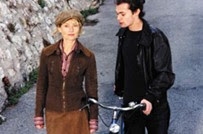a thousand deaths
by Douglas Messerli
Werner
Schroeter and Cédric Anger (screenplay), Werner Schroeter (director) Deux (Two) / 2002
Without making apologies for my
inability to accomplish what my role as a critic might entail, I must admit it
is, nonetheless, nearly impossible to coherently discuss Werner Schroeter's
fascinating film of 2002, Deux.
In some respects, it doesn't really matter, for the film is a kind of
collective experience of these two your women growing up in a post-World War II
environment. The pulls of this tale are, accordingly, love and death, as each
of the women explore sexuality, often in obsessive ways, attempting to fulfill
themselves in a world in which death is omnipresent, and is often connected to
the search for pleasure. A sad young, beautiful bicycler encourages
Magdalena/Maria to ride his bike, inviting her to visit him. But a few days
later his body is discovered hanging, an apparent suicide. A mysterious
murderer stalks woman throughout the city, leaving their disemboweled bodies
with a flower upon their breasts. An apparent orgy is imagistically transformed
into a mass of dead bodies, which cannot help but remind one of the gas chamber
carnage of the Second World War. Sexual encounters which begin with simple
flirtation, pulls growing groups of boys and girl into these women's presence
as if they were magnets for sexual satisfaction.
Whether or not the viewer can make "sense" (if he must make sense) of Schroeter's hundreds of beautiful tableaux, we easily recognize the psychological and symbolic power of the director's images. This is a world of deep sensuality and possible love, filled with horror and terrific presages of death. It is nearly impossible to separate the two, and the search for a wholeness of self that might steady the individual being is mostly fruitless.
In the end Magadalena/Maria must kill off—symbolically at least—the
other, accepting all that other has had to give (in Schroeter's powerful image
it is represented by swallowing her vomit), while burying her to achieve peace.
The incomplete being, dreaming, hoping, seeking—a romanticized vision of
humanity—is all, Schroeter suggests, we have available to us. We are,
accordingly, terrible failures as human beings; but, ah! what beauty our
aspirations have wrought!
Los Angeles, October 17, 2011
Reprinted from World Cinema Review (October 2011) and Reading Films: My International Cinema (Los Angeles: Green Integer,
2012).





No comments:
Post a Comment